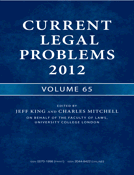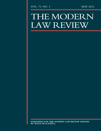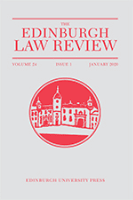
Cambridge Law Journal
Scope & Guideline
Connecting Past and Present in Legal Discourse
Introduction
Aims and Scopes
- Interdisciplinary Legal Analysis:
The journal emphasizes an interdisciplinary approach, integrating insights from philosophy, sociology, and economics into legal discourse, enabling a richer understanding of legal concepts and their societal implications. - Contemporary Legal Issues:
A consistent focus on contemporary legal challenges, including human rights, corporate accountability, and digital privacy, reflects the journal's commitment to addressing pressing legal matters in today's society. - Theoretical and Practical Perspectives:
By publishing papers that explore both theoretical frameworks and practical applications of law, the journal bridges the gap between academic research and real-world legal practice. - Historical and Comparative Legal Studies:
The journal also values historical perspectives and comparative analyses, exploring how legal principles have evolved over time and how they differ across jurisdictions. - Focus on Legal Reform and Policy:
A significant aspect of the journal's contributions includes discussions on legal reform and policy implications, encouraging scholars to propose innovative solutions to existing legal problems.
Trending and Emerging
- Artificial Intelligence and Law:
A significant increase in publications addressing the intersection of artificial intelligence and legal frameworks indicates a burgeoning interest in how emerging technologies challenge existing legal norms and require new regulatory approaches. - Corporate Accountability and Environmental Law:
Recent themes emphasize corporate accountability, particularly regarding climate change litigation and corporate governance, reflecting a societal push for responsible business practices and legal frameworks that support environmental sustainability. - Digital Privacy and Data Protection:
With the rise of digital technologies, there is a marked increase in discussions surrounding digital privacy rights, data protection laws, and the implications of surveillance, showcasing the journal's engagement with contemporary legal challenges. - Social Justice and Human Rights:
Emerging themes in social justice, including discussions on discrimination and the rights of marginalized groups, illustrate the journal's commitment to addressing issues of equity and justice within legal discourse. - International Law and Global Governance:
There is a growing focus on international legal frameworks, particularly in relation to global governance and human rights, highlighting the increasing complexity of legal interactions in a globalized world.
Declining or Waning
- Traditional Contract Law Theories:
There has been a noticeable reduction in papers focused on conventional theories of contract law, indicating a shift towards more modern interpretations and applications of contract principles. - Historical Legal Analysis:
Although historical legal studies have been a staple in legal scholarship, recent publications suggest a declining interest in purely historical analyses, with a greater emphasis now placed on contemporary legal issues. - Criminal Law and Procedure:
The frequency of papers addressing traditional criminal law and procedural topics appears to be decreasing, possibly due to a growing focus on interdisciplinary approaches that incorporate societal and psychological factors into criminal justice discussions. - General Jurisprudence:
While foundational jurisprudential discussions remain important, the journal has seen fewer contributions dedicated solely to general jurisprudential theory, reflecting a preference for more targeted legal analyses.
Similar Journals

Current Legal Problems
Pioneering discussions on pressing legal matters.Current Legal Problems is a premier academic journal published by Oxford University Press, dedicated to advancing the field of law through critical analysis and interdisciplinary research. With an ISSN of 0070-1998 and an E-ISSN of 2044-8422, this journal has established itself as a vital resource for legal scholars and practitioners alike since its inception in 1983. Recognized with a Q1 category ranking in Law for 2023, it ranks notably in Scopus as #415 out of 1025, placing it in the 59th percentile, further underlining its influence and importance. The journal's scope encompasses contemporary legal issues, providing a platform for innovative legal thought and discussion. Although it does not follow an open access model, the journal remains accessible through both print and digital subscriptions, catering to a global audience from its base in Oxford, United Kingdom. Researchers, students, and legal professionals will find Current Legal Problems indispensable for staying informed about the latest legal developments and scholarly debates.

MINNESOTA LAW REVIEW
Exploring the Boundaries of Legal Thought and PracticeMINNESOTA LAW REVIEW is a prestigious academic journal dedicated to advancing legal scholarship and discourse, published by the MINN LAW REVIEW FOUND in the United States. Established in 1976, this journal has become a cornerstone in the field of law, achieving an impressive Q1 ranking in the Law category for 2023, underscoring its significance and influence in legal studies, with a Scopus rank placing it in the 65th percentile among social sciences law journals. The ISSN number for both print and electronic editions is 0026-5535, ensuring broad accessibility to its scholarly contributions. With a commitment to publishing innovative and analytical articles that address contemporary legal issues, the MINNESOTA LAW REVIEW serves as an essential resource for researchers, students, and legal professionals seeking to deepen their understanding and engage with critical legal concepts. While it does not currently provide open access, its wide array of topics spans various disciplines within law, fostering a vibrant academic community dedicated to the exploration of legal principles and their applications. The journal’s editorial office can be found at 229 19TH AVE SOUTH, UNIVERSITY OF MINNESOTA, MINNEAPOLIS, MN 55455, where a team of experts curates content that reflects the evolving landscape of legal thought.

UNIVERSITY OF NEW SOUTH WALES LAW JOURNAL
Advancing Legal Scholarship Through Interdisciplinary InsightsUniversity of New South Wales Law Journal, published by the University of New South Wales, Faculty of Law, is a leading academic journal that serves as an essential platform for discourse in the field of legal studies. With an ISSN of 0313-0096 and an E-ISSN of 1839-2881, the journal has been a beacon of legal scholarship since its inception in 1983. Operating from Kensington, New South Wales, Australia, it provides profound insights into various legal issues, emphasizing interdisciplinary perspectives by also being recognized in the fields of philosophy, sociology, and political science. While it maintains a Q3 ranking in Law and has shown increased visibility in Philosophy at Q2 according to the 2023 category quartiles, the journal assures a diverse range of critical analyses from scholars, professionals, and students alike. It is particularly valuable for researchers seeking to engage with contemporary legal debates, ensuring they remain at the forefront of academic and practical discussions in law and related disciplines.

RED-Revista Electronica de Direito
Bridging Theory and Practice in Legal ResearchRED-Revista Electronica de Direito is a prestigious academic journal dedicated to the field of legal studies, published by the CENTRO INVESTIGACAO JURIDICO-ECONOMICA-CIJE in Portugal. Focused on providing a platform for the dissemination of innovative legal research, this journal aims to bridge the gap between theory and practice, covering a wide spectrum of legal disciplines including constitutional, administrative, and international law. Though currently not categorized under Open Access, RED strives to offer thorough and insightful analyses, making it an essential resource for researchers, legal professionals, and students alike. With the growing importance of interdisciplinary approaches in law, this journal serves as a vital conduit for the latest findings and discussions in the legal field, fostering a vibrant academic dialogue among its readership.

MODERN LAW REVIEW
Fostering Critical Dialogue on Contemporary Legal Issues.MODERN LAW REVIEW, a prestigious academic journal published by Wiley, stands as a significant platform in the field of law, dedicated to exploring contemporary legal issues and fostering scholarly discourse since its inception in 1937. With an impressive Scopus Rank of #237 out of 1025 in the Social Sciences - Law category, placing it in the 76th percentile, the journal has consistently maintained a reputation for high-quality research, currently positioned in Q2 of the category quartiles as of 2023. The journal's comprehensive coverage spans various legal topics, making it essential reading for legal scholars, practitioners, and students alike. Although it is not an open-access journal, its contributions are invaluable for guiding the future of legal scholarship. With a robust history of converged years from 1995, 1997 to 1999, 2001 to 2002, 2004, and 2011 to 2024, MODERN LAW REVIEW remains at the forefront of legal research, addressing pressing issues and influencing legal thought across disciplines.

Review of Central and East European Law
Exploring the Intersection of Law and Culture in Eastern EuropeThe Review of Central and East European Law, published by Martinus Nijhoff Publishers, stands as a pivotal academic journal dedicated to the legal developments and scholarly discourse in Central and Eastern Europe. With an ISSN of 0925-9880, this journal has been at the forefront of law and legal studies since its inception in 1975, becoming an essential resource for researchers, professionals, and students alike. The journal offers a rich interdisciplinary approach by integrating perspectives from classics, history, law, and philosophy, as evidenced by its classification across various quartile rankings. Specifically, it holds a prestigious Q2 ranking in Classics and is recognized within the upper echelons of History and Philosophy disciplines. With an accessible focus and insights into the evolving legal landscape, the Review of Central and East European Law continues to contribute significantly to understanding legal frameworks and practices in this dynamic region, ensuring its relevance in academic and professional circles.

Edinburgh Law Review
Elevating academic standards in the study of law and history.Edinburgh Law Review is a distinguished journal published by Edinburgh University Press, dedicated to advancing discourse in the realm of law, cultural studies, and history. With its ISSN 1364-9809 and E-ISSN 1755-1692, this journal has been contributing valuable scholarly content since its inception in 1997, and it continues to be a vital resource for researchers, legal practitioners, and students alike. Although it currently does not provide Open Access options, the journal's rigorous peer-review process ensures that each article meets the highest academic standards. Known for its diverse range of topics, the Edinburgh Law Review holds a Q4 ranking within its categories in Cultural Studies, History, and Law in 2023, reflecting a commitment to engaging with contemporary issues in these fields. With a noticeable presence in Scopus rankings, this journal is essential for those seeking to deepen their understanding of the intersections of law, culture, and history within a British context.

Lexonomica
Advancing Legal Scholarship for a Globalized WorldLexonomica is an influential academic journal published by UNIV MARIBOR, FAC LAW, dedicated to the field of legal studies and its intersections with socio-economic issues. With a commitment to fostering scholarly communication, Lexonomica offers a platform for researchers, practitioners, and students to disseminate their findings and insights on contemporary legal matters, policy analysis, and theoretical developments. Although currently not an open access journal, it plays a pivotal role in contributing to the academic dialogue within the legal community, as evidenced by its unique ISSN (1855-7147) and E-ISSN (1855-7155). The journal aspires to promote high-quality research and facilitate the understanding of legal phenomena in a globalized context, underlining its importance for those seeking to engage critically with the law in an ever-evolving landscape. The journal's address is located in beautiful Maribor, Slovenia, symbolizing a rich tradition of legal education and research.

Utrecht Journal of International and European Law
Fostering Global Legal DialogueUtrecht Journal of International and European Law, published by UBIQUITY PRESS LTD, serves as a dynamic platform for the dissemination of scholarly research in the realms of international and European law. Since its inception as an open-access journal in 2013, it has provided unrestricted access to cutting-edge legal scholarship, fostering global dialogue among legal professionals, researchers, and students. With a notable Scopus rank of 249 out of 1,025 in the law category and a commendable Q3 rating, the journal emphasizes innovative legal theories and practices relevant to contemporary global challenges. Located in the heart of the United Kingdom, the Utrecht Journal is committed to maintaining high academic standards while also promoting the exchange of knowledge across borders, which is crucial given the ever-evolving landscape of international law. As it converges its focus from 2020 to 2024, the journal seeks to become an essential reference for those dedicated to the exploration and expansion of legal discourse in this vital field.

AUSTRALIAN LAW JOURNAL
Illuminating the Landscape of Australian LawThe Australian Law Journal, published by Lawbook Co Ltd, has long been a cornerstone in the legal scholarly community, serving as a vital resource for legal practitioners, scholars, and students since its inception. With an ISSN of 0004-9611, this esteemed journal provides a platform for a diverse array of legal discourse, ranging from analyses of contemporary law to examination of historic legal principles. Though traditionally not open access, the journal continues to uphold a commitment to excellence through a rigorous peer-review process, thus ensuring high-quality research dissemination. The journal's extensive archives reflect its long-standing relevance, covering various periods including 1974 onward, with significant contributions made between 1976 to 1978, 1986 to 1988, and 1993, among others. Engaging with this publication is essential for those seeking to advance their understanding of Australian law and its application, making it an invaluable resource for anyone involved in legal studies or practice.